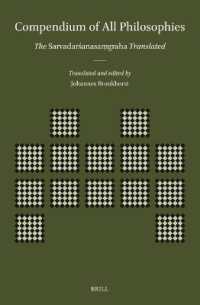- ホーム
- > 洋書
- > 英文書
- > Politics / International Relations
Full Description
Tony Blair's major new book on the art and science of leadership
_______________________________
'Engaging, insightful, provocative' Observer
'A fascinating treatise on leadership . . . I am glad Blair has written it. It will fascinate anyone interested in the art of governing, even in the abstract' Nicola Sturgeon, Guardian
'Filled with ideas and insight for every reader' i
__________________________________
Tony Blair learnt the precepts of governing the hard way: by leading a country for over ten years. In that time he came to understand that there are certain key characteristics of successful government that he wished he had known about when he started.
Now he has written the manual on political leadership that he would have wanted when he first took office in 1997, sharing the insights he has gained from his personal experience and from observing other world leaders at first hand, both while he was prime minister and since, through his Institute's work with political leaders and governments globally.
Written in short, pithy chapters, packed with examples drawn from all forms of political systems from around the world, the book answers the key questions: How should a leader organise the centre of government and their office? How should they prioritise and develop the right plan and hire the right personnel, cope with unforeseen events and crises, and balance short-term wins with longterm structural change? What's the best way to deal with an obstructive or inert bureaucracy, to attract investment, to reform healthcare or education, and to ensure security for the citizen? And how should governments harness the massive opportunities of the 21st-century technological revolution?
This is a masterclass on leadership in general, and political leadership in particular, from a master statesman.







